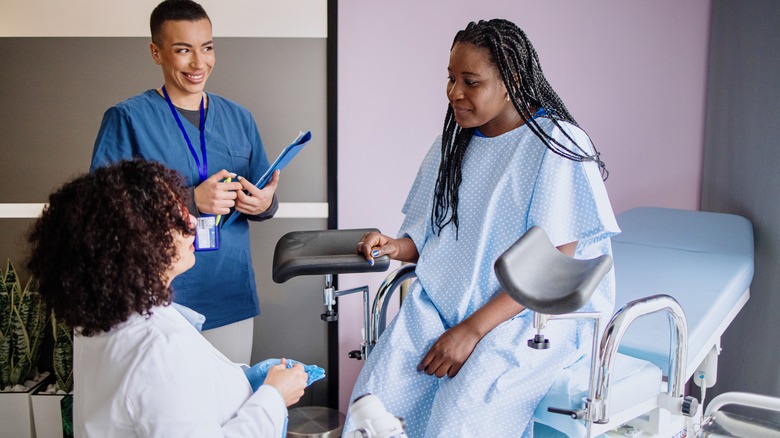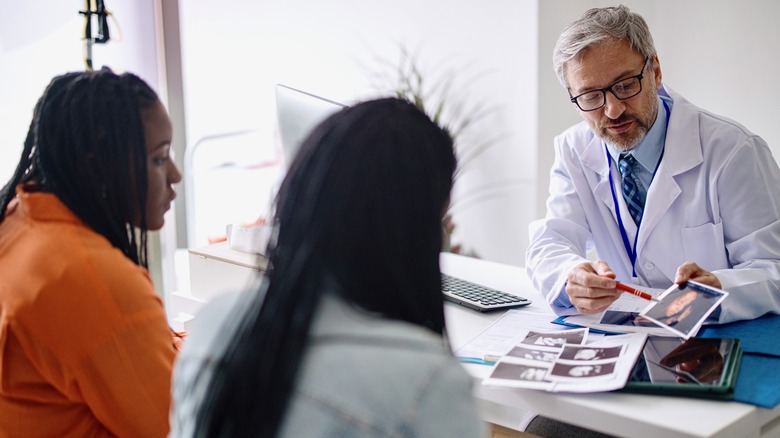The Emotional And Physical Toll Of IVF To Be Aware Of Before You Begin
In 1978, the very first baby was born using in vitro fertilization, or as it's commonly referred to, IVF. Since then, over nine million babies have been born worldwide thanks to IVF and according to a 2017 study published in Missouri Medicine, IVF has a success rate of 50 percent in women 35 and younger. For those wanting to be parents, IVF has become the go-to in the hopes of fulfilling those parental dreams.
But as much as we talk about IVF successes, we don't talk enough about the emotional and physical toll of it, nor the glaring fact that it's not a cure-all for people who want to be parents. IVF doesn't always work, and as women get older, success rates plummet. For those between 38 and 40, they have a 25.1 percent chance of IVF panning out for them, for women between 41 and 42, that percentage is 12.7 percent.
When Jennifer Aniston sat down with Allure in December 2022, she was candid about her struggles with IVF saying, "I was going through IVF, drinking Chinese teas, you name it. I was throwing everything at it." But even despite her years of effort, it just never came to be.
Aniston is just one of thousands of women who have gone through IVF and have been failed by the process. While in the same interview, Aniston said that she feels a "little relief now" because pregnancy is no longer a possibility, adding, "I don't have to think about that anymore," some women never make peace with not having a child of their own.
If you're considering IVF, it's important to be aware of the emotional and physical toll it takes.
What IVF does to your body
IVF isn't just one procedure but several. First, the ovaries need to be stimulated through the injectable hormones follicle-stimulating hormone (FSH) and a luteinizing hormone (LH) — in some cases, both are used. Next, comes the medication to mature the eggs in preparation for retrieval. In most cases, human chorionic gonadotropin (HCG) is used, but other medications can do the same.
During this process, you will also take medication to prevent the ovaries from releasing the developing eggs sooner than they should as well as medication to prepare the lining of the uterus for the retrieval. The eggs are then fertilized in a lab with sperm — this could be your partner's, a male friend, or an anonymous person — making them embryos that are transferred into the uterus. Of course, the more embryos the better your chances of having at least one becoming a fetus, so because of this doctors transfer more embryos into older women. For younger women, there is the option to freeze embryos for a later date.
A full IVF cycle takes about three weeks. If the first round doesn't work then one or, in some situations, many more cycles might be needed to achieve a successful pregnancy. While a 2015 study published in Jama originally suggested IVF cycles shouldn't surpass three or four attempts, with further research, the same study actually found that six cycles was the money spot, particularly for women under 40. But no matter what research and doctors suggest, that doesn't mean all women will abide. The heart wants what the heart wants, and for some, that means several IVF cycles.
What IVF does to you emotionally and mentally
Although not all women report side effects from the hormones pumped into their body during IVF, those who do experience them often deal with mood swings, anxiety, and even depression. When you take these hormonal changes and add them to the emotional rollercoaster that already comes with trying to conceive, the combination can be overwhelming.
No one goes into IVF half-heartedly. People go into it hoping for a happy ending. But if couples have tried over and over to get pregnant naturally, then they opt for IVF, it's usually a last resort decision. Because of this, there's a lot weighing on the IVF succeeding. If it doesn't, hopeful parents can feel a sense of loss, as well as guilt or anger. By evolutionary standards, humans are "supposed" to procreate to keep the species going, so when you desperately want a child and IVF doesn't work, it can feel like your body is betraying you.
"There's trauma around infertility and everything that goes into it," licensed marriage and family therapist Marissa Nelson, L.M.F.T. tells SELF. "There's this sense of injustice, but there's also some trauma around your process to parenthood. It's almost a PTSD response to ... everything you've gone through up to this point. So you may experience an elevated amount of anxiety or depression; racing thoughts; the hypervigilance; the hopelessness and possibly helplessness, feeling powerless over the situation."
The best thing you can do during this time is to surround yourself with a supportive network of friends and family who will be there to cheer you on just as much as they'll be there if you need more than one IVF cycle.
What IVF does to your bank account
IVF isn't just about the physical, emotional, and mental toll, but the financial toll as well. IVF is extremely expensive, making it not an option for everyone. According to Fertility IQ, on average, one cycle of IVF costs over $20,000 and where you live plays a role in this. For example, in LA, IVF costs over $25,800, while in Boston it's just a bit over $20,000.
Although insurance plans don't have to include coverage for IVF or other fertility-related treatments, more companies are starting to include it in their insurance plans. Also, there are a handful of states with infertility insurance laws like New York, Massachusetts, New Hampshire, Colorado, California and a few more. However, it's important to keep in mind that while these laws exist and some companies are willing to help with fertility issues, if you undergo multiple IVF cycles, you'll be hard-pressed to find any company or state that's going to cover more than one cycle.
Before turning to IVF, there's a lot to consider. While some people are willing to go broke if it means having a child of their own — and that's very admirable — the most important thing to keep in mind is that IVF isn't a guarantee and no IVF doctor can promise you the happy ending you're looking for. But if you've reached a point in your fertility journey where IVF is your last option and you're prepared for the challenges, then give it go. Just be sure to have realistic expectations and surround yourself with the type of people who will bend over backward just to be by your side through it all.



